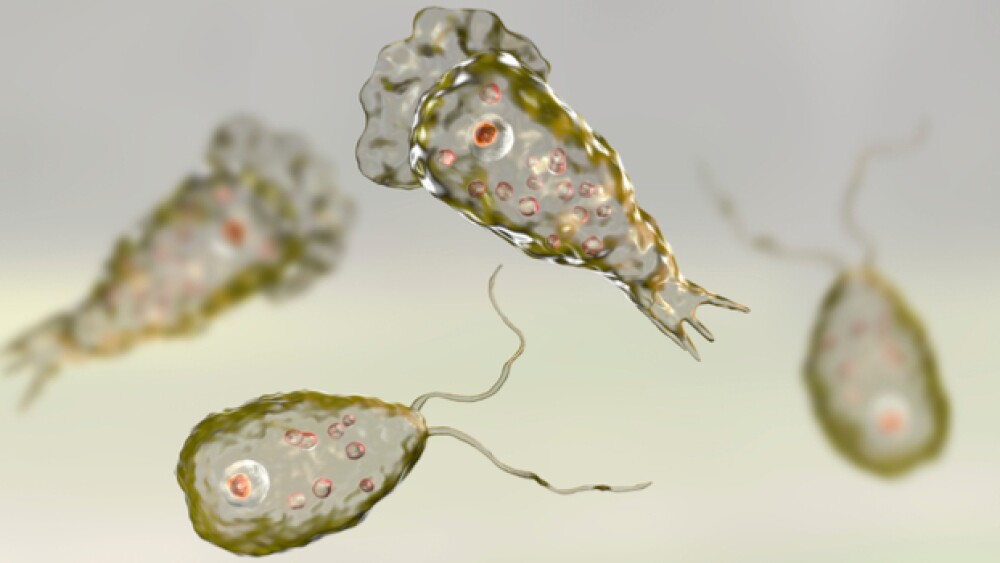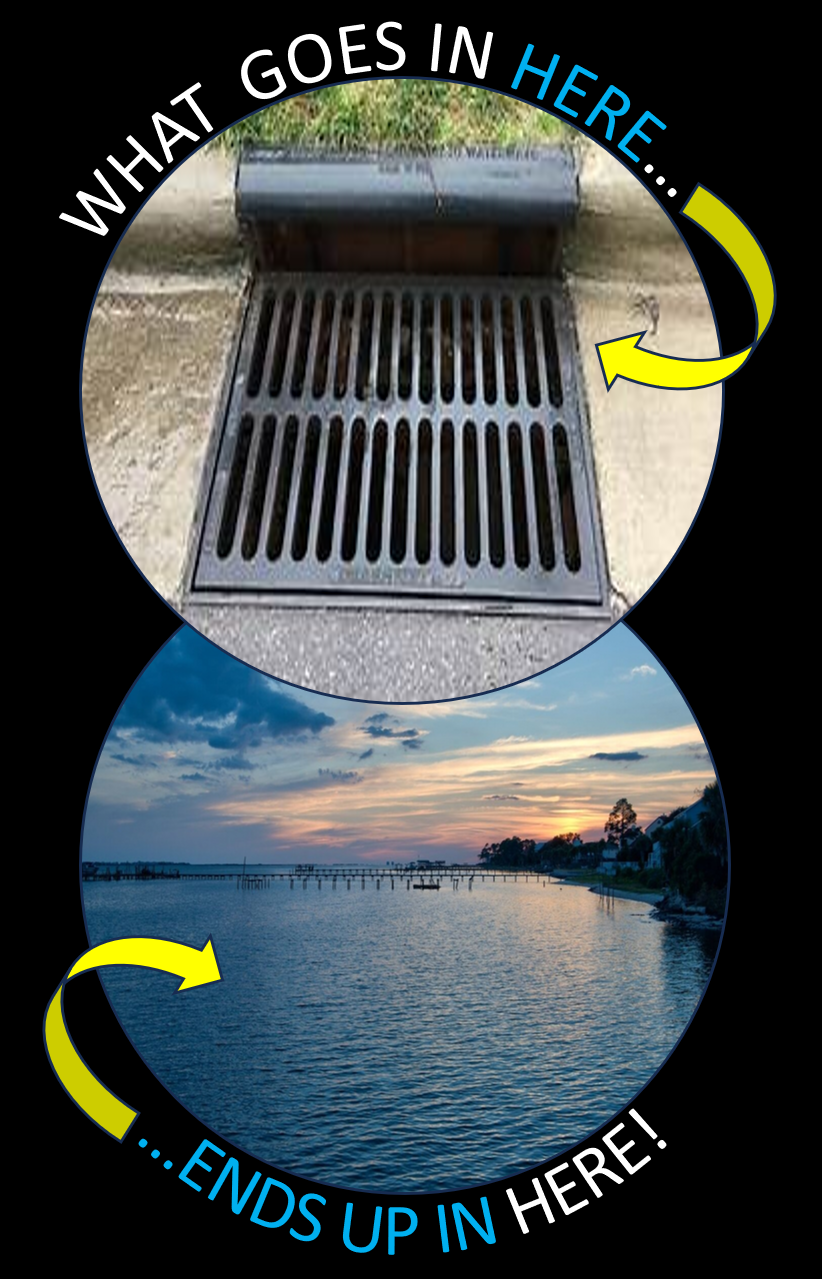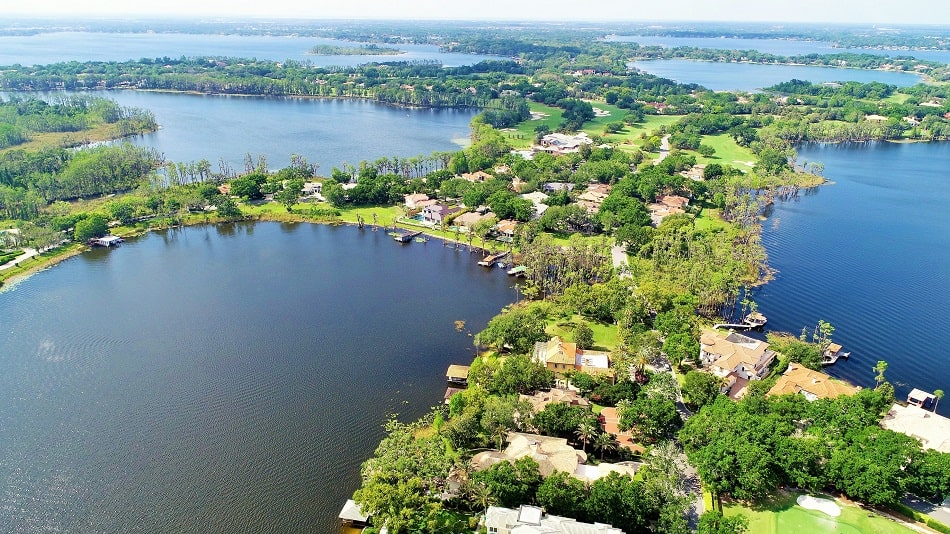Lakes Management and Stormwater Protection
The Town of Windermere is home to a unique chain of lakes that define our community’s beauty and quality of life. Protecting these natural resources is a shared responsibility. Through the NPDES program and proactive lake management strategies, we work to reduce pollution, manage stormwater, and preserve water quality.
What is Stormwater Runoff?
Stormwater runoff occurs when rainwater flows over surfaces like roads, rooftops, and driveways, carrying pollutants into storm drains and eventually into our lakes. This water is not treated before entering the environment.
What Can You Do?
Never dump anything into storm drains.
Keep leaves, yard clippings, and trash out of the streets and ditches.
Use fertilizers and pesticides responsibly.
Dispose of household hazardous waste properly.
Wash cars on the grass or at commercial car washes.
Town Initiatives:
Regular street sweeping and drain maintenance.
Community education programs (such as Lake Clean-Ups) and NPDES compliance.
Shoreline vegetation management.
The Basics
All plants need nutrients, but they can only take up a certain amount at a given time.
Nutrient pollution is the primary type of pollution in Florida’s waters. Much of it comes from fertilizer use in urban landscapes.
Sod, turf, grass, and ornamental landscape plants can only take up so much in the way of plant nutrients (fertilizer)…that which the plant isn’t capable of absorbing runs off into local lakes.
Nutrients applied to land plants and sod as fertilizer cause algae and invasive aquatic plants to grow out of control.
When too much fertilizer is applied, or the wrong formulation is used, nutrients not absorbed get washed into lakes. Lawns do not soak up or absorb extra nutrients.
Nutrients (fertilizer) must be properly delivered to the plant – either to the leaf or to the root system. Any product that isn’t absorbed will run off.
Fertilizer applications must also consider timing of rainfall events. Rain washes excess fertilizer into lakes and waterways. It only takes ¼” of rain to wash off a fertilizer application.
Orange County’s fertilizer ordinance provides detailed instructions for formulations and timing of applications, including a blackout period from June 1 to September 30 for any fertilizer containing nitrogen or phosphorus.
Permitting Information
It’s always best to reach out to each agency before work starts to confirm if a permit is needed, if the work qualifies under an exemption, and what the specific requirements are. Click a link below for more information:
Construction of docks, seawalls, boathouses, etc. may require a permit from the Florida Department of Environmental Protection
Depending on the scope of work (aquatic plant management, seawall/dock construction, etc.), lakefront properties may also need a permit from Orange County Environmental Protection Division
Helpful Resources
“What’s Happening on My Lake?” – Florida Fish and Wildlife Conservation Commission
Orange County Environmental Protection Division manages the invasive aquatic plants that pose the greatest risk to the Butler Chain under the State of Florida’s Workplan agreement administered by the Florida Fish and Wildlife Conservation Commission’s Invasive Plant Management Section. Specifics on this program and species authorized for treatment can be found here
Windermere Current Posts
JAN 25 | |
FEB 25 | |
MAR 25 | |
APR 25 | |
MAY 25 | |
JUN 25 | |
JUL 25 | |
AUG 25 | |
SEP 25 | |
OCT 25 | |
NOV 25 | |
DEC 25 |
Gazette Articles
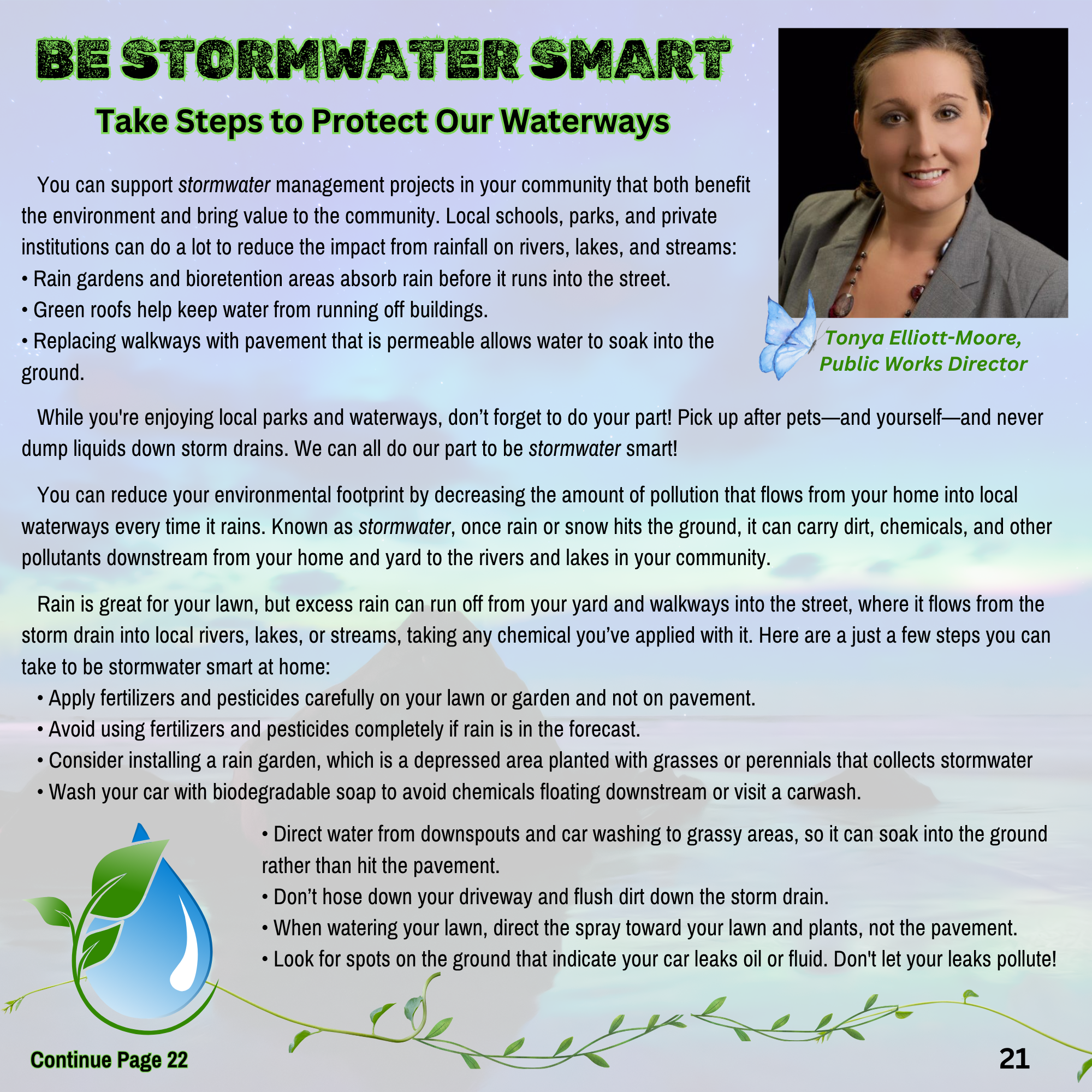
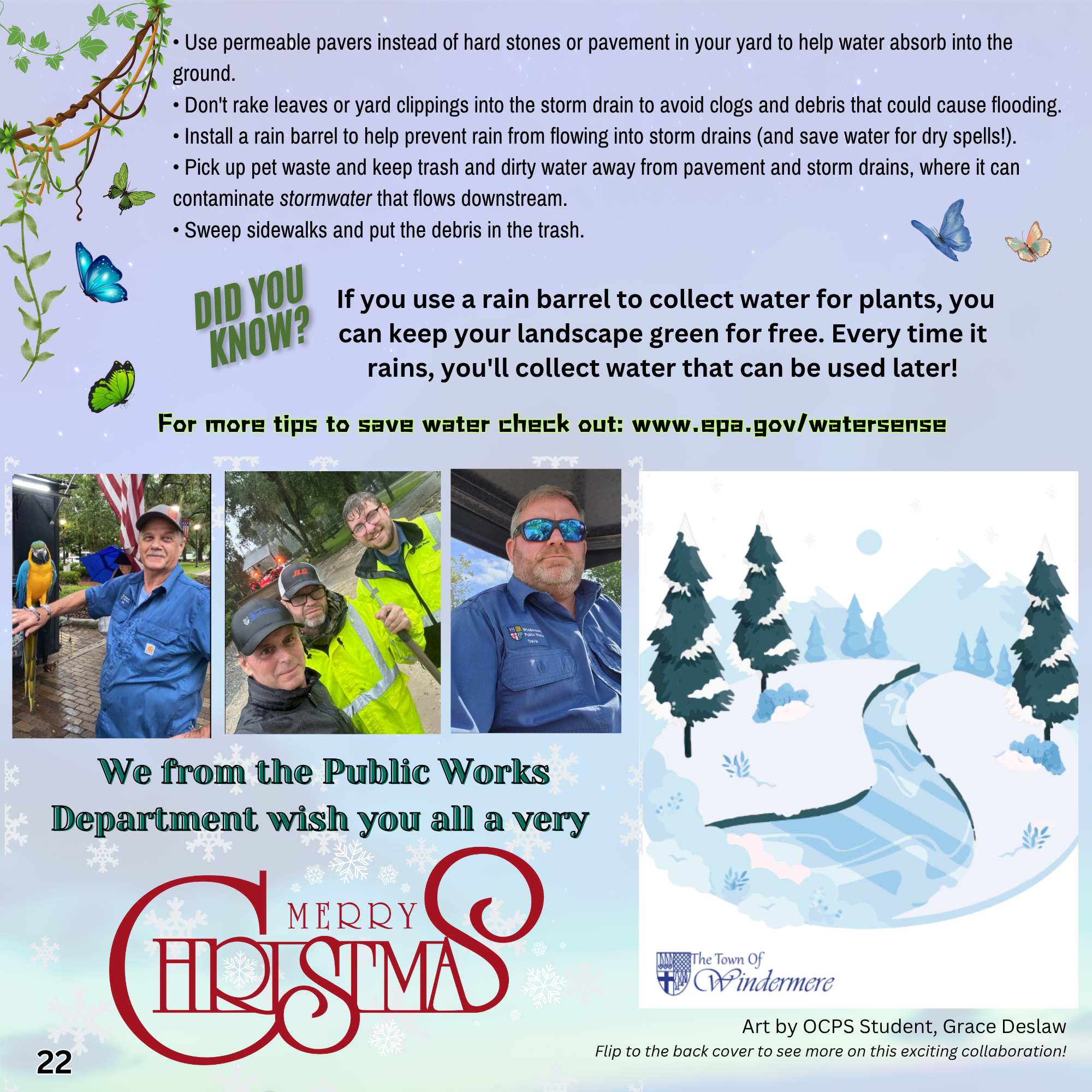
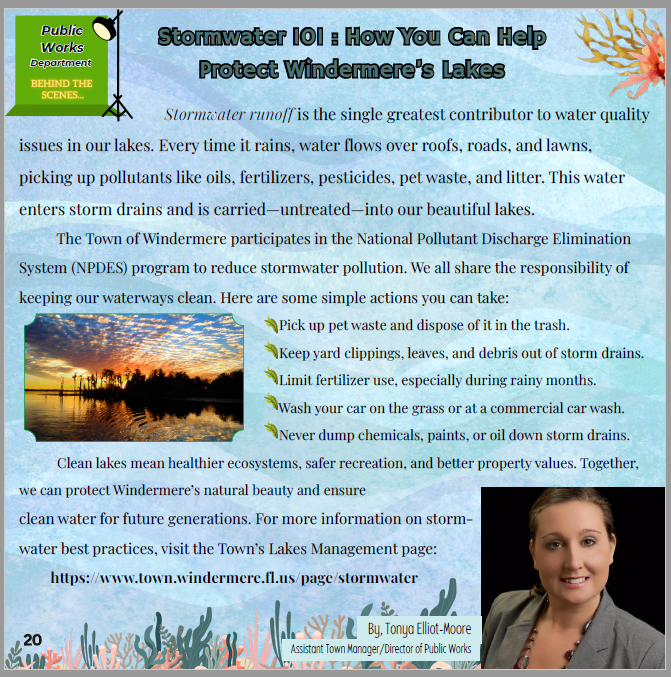
More about How You Can Help...
Clean up after your pet. Pet waste should be bagged and disposed of in the garbage. Pet waste contains elevated levels of nutrients as well as disease-causing pathogens and parasites.
Sweep up any fertilizer that lands on a paved surface to prevent it from washing off into lakes.
Keep yard waste out of streets and sidewalks.
Wash your vehicle in a grassy area or in a designated car washing site. Make sure the detergent you use is free of any phosphorus.
Please adhere to the guidance in the fertilizer ordinance…and make sure your landscaping company does, too.
Please do not feed wildlife – birds, squirrels, fish, etc. When wildlife congregates, the animal waste is concentrated in one area and pollutes our lakes with nutrients and potentially harmful microorganisms.
Lakefront properties should be planted with native aquatic plants. Ideally, a combination of submerged, emergent, and floating species adds aesthetic beauty and many ecological benefits to the lake.
State of the Lakes
Amy L. Giannotti, MS, CLM, of AquaSTEM Consulting, presented the “State of the Lakes” at the January 11th, 2022 Windermere Town Council meeting.
Download the presentation here
Watch the presentation here (actual presentation starts at the 41 minute mark)
Harmful Algal Bloom Resources
Blue-green algae, or cyanobacteria, are the oldest living organisms on earth. They have been around for millennia in freshwater systems, and they have the ability to produce toxins under certain environmental conditions. Blooms, however, are not always visible, and there is no visual way to determine the presence or absence of toxins. If toxins are present, they may persist for hours, days, weeks, or months.
Unfortunately, scientists don’t fully understand the mechanisms driving toxin production, but we do know that algal blooms are more prevalent when water is warm, nutrients are abundant, and sunlight is plentiful.
Climate change is resulting in increased intensity, frequency, and duration of algal blooms. Cyanotoxins can be harmful to the skin, nervous system, liver, and other physiologic systems via exposure from recreational activities.
It is always recommended to wash with soap and tap water after any contact with surface waters (fresh or saltwater).
Naegleria Fowleri, the Brain-Eating Amoeba: What Do I Need to Know?
This microorganism is found in nearly every freshwater system on earth – from mud puddles to lakes to rivers and reservoirs.
When water temperatures exceed 80 degrees Fahrenheit, the amoeba is more active and is also more likely to result in infection in humans because recreational activities in water increase in warmer months.
Although rare, it has an exceptionally high mortality rate. Infection occurs only when water is forcefully shoved into the nasal passages of an adult or child. The best protection for swimmers and skiers is to wear noseclips or a scuba mask to prevent possible exposure.
It cannot cause infection if water is ingested, enters the eyes, ears, or cuts.
